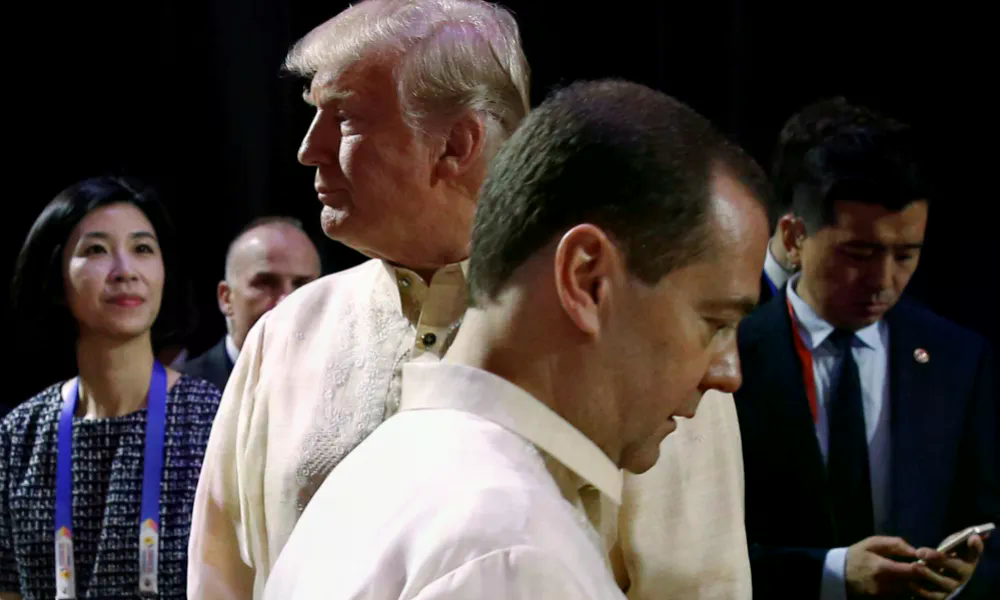
Dmitry Medvedev, the former president and prime minister of Russia, has recently regained public attention following a series of online exchanges with U.S. President Donald Trump. The situation escalated after Trump issued a warning to Medvedev, urging him to “watch his words” and ordered the repositioning of two U.S. nuclear submarines in response to what he described as provocative statements from the Russian official.
Trump made the announcement on his Truth Social platform on August 1, stating that the submarine movements were a precaution against potentially dangerous rhetoric from Medvedev. However, the president did not specify the regions or the type of submarines involved. Medvedev, who holds the position of deputy head of Russia’s Security Council but does not have authority over nuclear operations, responded with a defiant message on Telegram. He suggested that the U.S. president’s reaction demonstrated Russia’s correctness and its commitment to pursuing its own path.
The exchange between the two figures began in mid-July when Trump urged Russian President Vladimir Putin to negotiate a peace deal with Ukraine within 50 days. Medvedev dismissed the ultimatum as theatrical, claiming that Russia was indifferent to such demands. According to a former Russian diplomat, while Trump’s remarks may signal a message to the Kremlin, the movement of the submarines carries little military significance.
Boris Bondarev, a former Russian diplomat specializing in nuclear non-proliferation, noted that Trump’s comments reminded the world that nuclear weapons are not exclusively a Russian asset. He added that if such a diplomatic approach had been part of a broader strategy to align Putin’s global perspective with reality, it could have marked a turning point in the conflict in Ukraine. However, Bondarev expressed doubt that Trump’s statement was serious, suggesting it was more of a political gesture than a genuine threat.
From the perspective of a Ukrainian military analyst, the Trump-Medvedev dispute reflects larger geopolitical maneuvering between Moscow and Washington. Lieutenant-General Ihor Romanenko, a former deputy head of the Ukrainian General Staff, said that Putin uses Medvedev as a figure to make statements about nuclear threats without tarnishing his own image as a peacemaker. In this context, Medvedev serves as the “bad cop” in a media spectacle involving the United States.
Meanwhile, Trump’s decision to reposition the submarines is seen as a strategic move ahead of an upcoming summit with Chinese President Xi Jinping. The meeting, possibly scheduled for September 3, coincides with China’s celebration of the 80th anniversary of Japan’s surrender in World War II. While Putin has already been invited to attend a military parade in Beijing, Trump is still considering his participation. Romanenko suggested that the Trump-Medvedev feud could be presented as a diplomatic victory to Xi, alongside potential agreements on a ceasefire in the Black Sea region.
Ukrainian analysts also note that some Russians view Medvedev as a political has-been, whose online rants are reportedly influenced by personal struggles, including allegations of worsening alcoholism. Medvedev’s political career began in 2008 when he was elected president after Putin completed two consecutive terms. This transition, known as a “castling” in chess terminology, sparked jokes about the power dynamics between the two leaders. One popular anecdote depicted Putin ordering steak for both himself and Medvedev, highlighting the perceived imbalance of influence.
Despite his initial efforts to distinguish himself from Putin, Medvedev cultivated a more open and reformist image, engaging with Western cultural figures and advocating for cautious reforms. However, his tenure ended with widespread protests against Putin’s return to power in 2012 and subsequent crackdowns on dissent. His approval ratings continued to decline during his time as prime minister, particularly after a viral documentary exposed the luxurious lifestyle of his family.
In 2022, Putin removed Medvedev from his position and placed him in a less influential role at the Security Council. This demotion led to a shift in Medvedev’s public persona, transforming him into a vocal critic of Ukraine and other ex-Soviet states, often using online platforms to express aggressive rhetoric. Analysts offer several explanations for this transformation.
Nikolay Mitrokhin, a researcher at Germany’s Bremen University, outlines three perspectives. One suggests that Medvedev’s political downfall led to personal struggles, including substance abuse. Another compares his behavior to that of Soviet leader Nikita Khrushchev, who adopted a submissive stance under Stalin to survive and later compete for power. A third explanation attributes his aggression to a deeply ingrained personality, describing him as a “warlike” figure with psychological complexes. Mitrokhin notes that while Medvedev’s actions are limited by Putin’s approval, they reflect a calculated effort to assert his identity under the Kremlin’s watchful eye.


